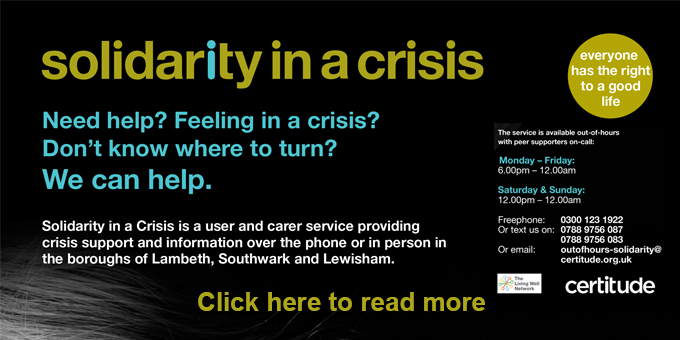Solidarity in a Crisis peer support service is expanding into Southwark and Lewisham. It has been an exciting time for the Lambeth service, run by Certitude, which has gone from a weekend crisis phone line to seven nights a week.
It has also been cited as a model of good practice in the London mental health crisis commissioning: Case studies (Strategic Clinical Networks, NHS England). The case studies are practical examples, which alongside the guide provide standards for the future commissioning of crisis services and is London’s response to the Crisis Concordat.
Patrick Nyikavaranda, Peer Involvement Co-ordinator, says it was an “amazing experience” to share with others what works and the challenges faced in “ensuring that people avoid, deal with or build resilience with each crisis they experience”.
Meanwhile, the team is growing and there are “learning opportunities and new challenges that arise on a daily basis”. Having new Team Leader Maria Gonzales on board, who is “inspirational, understands how to support people and is committed and passionate to working with people in distress has been a bonus”.
He adds that there have been many challenges with the project’s increased profile, the complexities of some of the calls, as well as the transition from a small team to a service expanding to other boroughs. The stark reality is that the service has been a lifesaver for some… “quite amazing when you think we are just listening”, says Patrick almost apologetically about the lived experience peer support tenets of being genuine, empathetic and congruent.
“Crises don’t just happen over the weekend”, adds Patrick, and the increasing number of calls validates a seven-day service. “November was very busy with people starting to get anxious about Christmas and family relationships and we’ve had more calls from people who hear voices. It’s also interesting to note we are getting more calls from people in employment, finding work stressful, doing long shifts and not having anyone to talk to when they get home.”
Patrick has nothing but praise for the 11-strong team (they have recently recruited two new people) who use their lived experience to listen and support people on the phone or meet in the community for a coffee at the weekend.
“They are amazing. Each individual brings unique qualities, which are giving people the opportunity to have what everyone craves for – to be able to listen to others, to have someone listen to you and to have some one stand by you.”
Each peer supporter has benefited from being part of Solidarity in a Crisis and there are hopes that more people will have that chance as the service expands. Through their lived experience, people “find healing as much as they begin to heal others, find solace as much as they provide comfort, are empowered as much as they facilitate choice and control in the lives of the individuals who access the service”.
Wise words were a lifesaver
Anna found a Solidarity in a Crisis flyer in her GP’s surgery in June 2014. She was struggling after she had returned to her job in corporate marketing, she thinks, too soon after her hospital admission. She was hearing voices and her medication wasn’t working.
She describes how the first SiaC peer supporter she spoke to on the phone that night helped to “talk me down”, when she was suffering from “extreme anxiety”. That, as well as sharing his own experiences and adding, “some wise words, which were a lifesaver”, have helped her get through the darkest times.
A peer supporter who has been with the service since its inception puts it thus: “Being part of Solidarity, now coming up to its third year, has been an incredible journey; in those moments of speaking to individuals has been filled with some sadness knowing the person is experiencing distress, but also a great privilege to be able to ‘be there’ for that person in a way they have needed it during the listening.
“During the next phase of SiaC and my time with it, I hope to continue this ‘being there’ for all who make contact and together find a clearing through that difficult moment that the individual is experiencing.”
Certitude’s Director of Mental Health Nicholas Campbell-Watts is excited and inspired by the opportunity to extend Solidarity’s work into Southwark and Lewisham and they will be recruiting local people to be on the phones from their own homes.
“Peer support should be part of the integrated offer of support available to people at times of personal crisis,” he says. “We know from the stories of people in Lambeth who have used SiaC that being heard, understood and accepted by someone else with a shared experience can be life-changing. SiaC was available throughout Christmas and New year, including Bank Holidays as this can be a bleak time for people.
“The service has also started to pilot social evenings, bringing people together to develop mutual support and friendships that will hopefully reduce the isolation and loneliness that can exacerbate personal crisis. We are also designing workshops around crisis prevention and resilience and generally promoting well-being, as well as offering out of hours peer support for people experiencing paranoia and beliefs.”
Click herefor Solidarity opening times
Click here to read Anna’s full story
Click here to read about peer supporter Rosetie’s journey
Click here to read about SiaC’s new Team Leader
Read more about the London response to mental health crisis commissioning below.
For London mental health crisis commissioning standards and recommendations click here
For London mental health crisis commissioning: Case studies click here
For London mental health crisis commissioning guide click here
Karen Hooper

